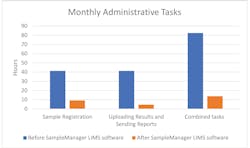Streamlining fertility treatment using clinical lab informatics solutions
Sharing information quickly is essential for clinical laboratories to not only support decision-making by physicians, but also differentiate service offerings from competitors. The prompt delivery of test results can positively impact patient outcomes by expediting the initiation of a potentially life-changing treatment program or guiding a change in therapy. However, to assure patient safety, it is crucial to ensure information is shared in compliance with the latest industry standards around data integrity.
Despite the importance of rapid, highly accurate reporting, clinical laboratories still often rely on fragmented systems, such as paper-based records and offline spreadsheets, to manage data. With many of these documents stored in multiple locations and accessed by numerous technicians, this approach is notoriously prone to errors. Moreover, manually populating existing records is extremely laborious, taking up time that could be better spent on other business-critical functions such as improving existing tests.
To address the challenges associated with established methods of data entry and communication, many clinical laboratories are turning to the latest cloud-based laboratory informatics solutions. By promoting compliance with regulatory guidelines, these systems support the highest standards of data accuracy, consistency, and completeness, alongside improved turnaround times and throughput.
Overcoming the challenges around clinical data management
A sudden spike in laboratory workload prompted Examen – a diagnostics company based in Belfast, Northern Ireland, focused on transforming the diagnosis and treatment of male reproductive issues – to incorporate a new laboratory informatics solution into their workflow. This decision was driven primarily by growing demand for the company’s sperm DNA fragmentation test (SpermComet), a method that provides a measure of DNA damage in sperm to aid prediction of fertility treatment success.
By coupling DNA fragmentation with semen analysis to provide a complete picture of sperm health, physicians rely on Examen’s services to help clients make informed choices about in vitro fertilization (IVF) treatment. The process hinges on the prompt delivery of highly accurate DNA fragmentation test results to support clinical decision-making. However, with a rapidly expanding workload due to business growth, Examen’s existing data management systems were under considerable strain.
A key limitation of Examen’s established systems was that data processed in the laboratory was routinely stored in multiple locations. Following the lengthy procedure of sample registration and subsequent testing, extraction of information from disparate systems frequently made it impractical for technicians to generate reports on the same day. Moreover, at peak times, results reporting could be delayed until the next day or even to the end of the working week, risking data integrity by introducing the possibility that observations made during the testing process could be overlooked.
The problem of delayed reporting was compounded by the fact that data would often have to be manually transferred into reports from separate spreadsheets, adding time to workflows and significantly increasing the potential for error. With Examen pursuing ISO 9001 certification, it was essential to maintain the highest standards of data integrity, and it was apparent that the business demanded a more efficient data management solution to deliver on tight turnaround targets while meeting all regulatory requirements.
After considering multiple options, Examen chose to adopt a cloud-based laboratory informatics solution. With the promise of considerable time savings, especially during sample registration and results reporting, this represented an effective solution to increase productivity. Additionally, by freeing up researchers’ time to further validate and improve the company’s product offering, automated data management provided scope to extend the reach of the business.
Boosting efficiency with cloud-based laboratory informatics solutions
Cloud-based laboratory informatics solutions are a highly effective method for managing data, resources and workflows within a single centralized system. With vast flexibility for configuration, these models provide end-users with in-built data integrity and security measures for compliance with worldwide regulatory requirements. Moreover, cloud-based architecture provides a scalable solution to enable future business growth.
By centralizing data management using a cloud-based laboratory informatics solution, Examen was able to significantly boost productivity and efficiency. A major factor in achieving this was the connection of the company’s instrumentation to a single centralized system; by allowing raw data to be stored directly to the solution, the need for multiple, time-consuming manual data transfer steps was eliminated.
Figure 1 illustrates the time-savings made by Examen as a result of implementing a laboratory informatics solution. The time spent on administrative tasks was reduced from over 80 hours per month to under 15 hours, including an approximate four-fold decrease in sample processing times and a reduction in results reporting from over 40 hours per month to less than five hours. With improved turnaround times translating to same-day reporting as standard, the company has used the associated efficiency gains to focus on business development.
A further benefit of centralized data management is that it allows for more efficient organization of resources, as exemplified by Examen’s use of software to manage the liquid nitrogen canisters employed to transfer sperm samples to the laboratory. By tracking the calibration of these canisters digitally, rather than relying on established pen-and-paper methods, the risk of an error that could lead to a sample becoming unusable has been minimized.
Supporting data integrity and regulatory complance
Examen sought to achieve the highest standards of data integrity, in accordance with ISO 9001 quality management requirements, prompting a switch from manual processing to a cloud-based laboratory informatics solution. By automating processes and eliminating manual data transfer steps, the potential for human error has been greatly reduced. Moreover, the implementation of a single centralized solution has allowed all user interactions with the system to be securely logged and easily searched, demonstrating compliance with ISO 9001 guidelines through a reliable audit trail.
As just one example of Examen’s efficiency gains, direct connection of the cloud-based laboratory informatics solution to the company’s microscopes has allowed raw data to be collected and parsed into a report within seconds, with the original measurements securely archived. Not only has this resulted in considerable time savings, it has also eliminated possible transcription errors and streamlined the location of data for audit purposes.
A flexible solution to support future growth
Following the successful implementation of a cloud-based laboratory informatics solution, Examen hopes to further capitalize on the benefits of centralized data storage by digitizing standard operating procedures (SOPs). For instance, by allowing protocols and parameters to be downloaded directly to instrumentation, or operators to be guided through SOPs on tablets, this approach promises to further lessen the potential for error while boosting productivity. To complement this measure, Examen is also considering the introduction of sample barcoding to improve sample traceability.
An additional advantage of centralizing data management is that customer portals can be enhanced in line with a specific business requirement: for example, enabling physicians to be automatically notified of reports as soon as they are ready. Underlying this capability is the flexibility and scalability offered by the cloud-based architecture, which permits rapid expansion of data management workflows without the need for substantial investment in internal IT resources.
Conclusion
Clinical laboratories are under increasing pressure to deliver against demanding turnaround times while maintaining compliance with the latest standards around data integrity. By streamlining data management using a cloud-based laboratory informatics solution, Examen was able to significantly boost operational efficiency and function to ISO 9001 guidelines. This new system will ensure smooth scale-up in line with growing demand for the company’s services, enhancing Examen’s position as a market leader in male infertility treatment.
About the Author

Katie Evans, M.S
is a Senior Product Manager for the Digital Science business at Thermo Fisher Scientific. During her 22-year tenure, Katie has focused on product management and strategy development of Laboratory Information Management Systems (LIMS) software with an emphasis on the needs of laboratories serving regulated markets. Katie received her Master of Science degree from Exeter University, UK.
